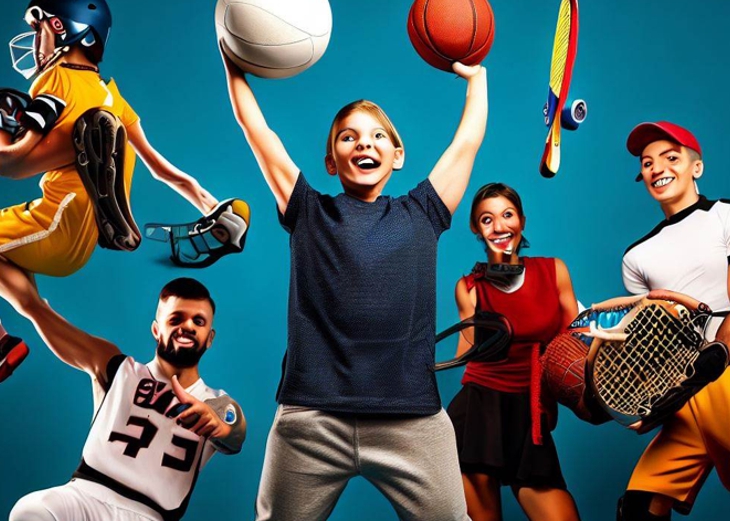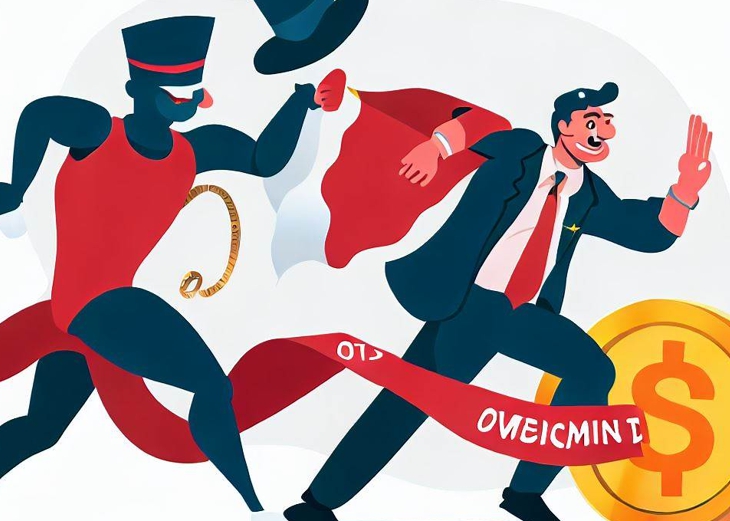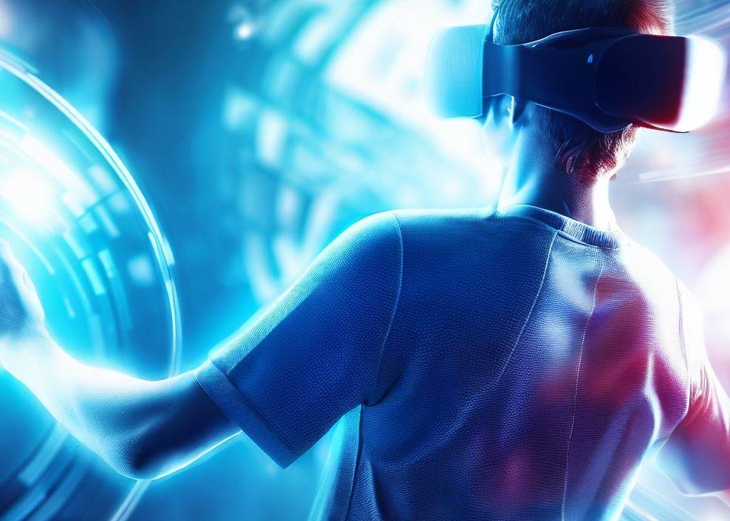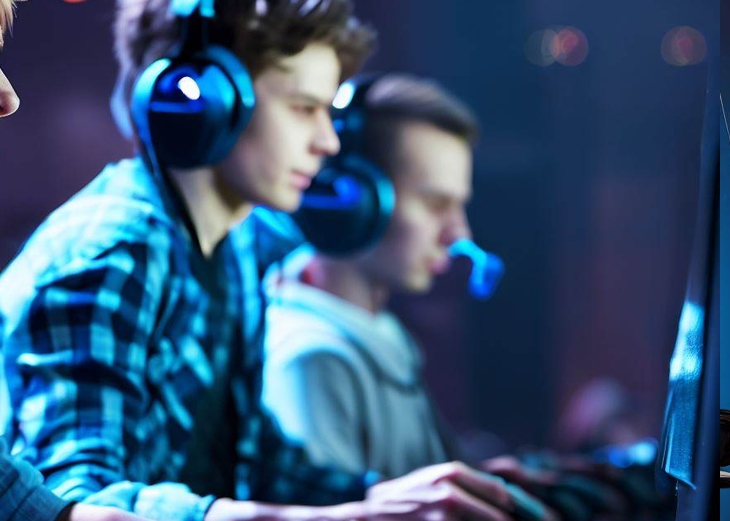Do you ever feel that you would like to gain control over your life? Do you ever feel depressed due to emotional conflicts? Do you admire those who are happy all the time and bring happiness to the people around them? Once you realize the nature of your mind, all of this will be remedied.
I gather about twenty-two friends, and tell them that I have a sphere, made of leather and pressurized, that is, with pure and ordinary air, blown into it without possibility of escape, and that we must with this sphere divide ourselves into groups of equal number of participants, and try among ourselves, to use our feet to propel this sphere to each other and simply that. To make it more interesting, a friend of mine comes up to me and tells me that since the areas where we're going to do this are so big, we should delimit that area of bouncing the ball off to each other, and suggests a rectangle. We stood there, twenty-two marmanjos, just kicking a ball, to each other and that in itself is fun to some extent. Other ideas arise as we start this play of adults (at least in the beginning), in a more orderly way, and that then we make a division of the sides, in order to obtain a partition and a common point for the beginning of this game, and further adds that one of us should always start the game without interference and for this we should use a coin with his faces, Each one takes his choice and the one who gets the result for himself chooses the side or ball. And the joke becomes even more interesting when these twenty-two men playing, add ideas like adding other rectangles each on its side, upright, and the challenge grows when the opined refers to everyone's ability to put this sphere (the ball) from inside the larger rectangle into the smaller rectangle, crossing your area first. Another suggests that we should count the number of times we could do that, and count that score for each side (team) and so on... with a little more addition among other items, we have FOOTBALL. Sport? Yes if we consider all its creation and operational and technical purpose. But sport because we use the physical? If the physical effort by competition is the justification of SPORT, then two people washing dishes, in their physical effort can already start the foundation of the Confederation, Federation or Sports Association of Dishwasher - and yes, electronic sport demands physical effort, in addition to mental and psychological, but we will deal with this later. We know that it is not so, and that certainly the mention of "arcade", or "little game", "video game" and so many others do not denigrate in any way the origin of Electronic Sports, this simply reflects a lack of knowledge of the cause, or defense of a mistaken and to some extent retrograde positioning of what the need makes us evolve, And for certain purposes and lack of vision, we have not evolved. Just as the play with the leather sphere has evolved to the extent that its purpose has changed and also evolved, we have to, with total coherence and common sense, evolve our vision of what Electronic Sports is, and its current needs that have gone from evolution to impose themselves as true REVOLUTION. Speaking of which, the play with the leather sphere today yields millions, billions of dollars of investments, negotiations, various contributions, including greatly influencing the values of human capital involved in this "game", and all this for what? What is the point of investing in someone or group of people who simply have good skills for themselves in controlling this "leather sphere", what is the reason? The reason was simple: we decided that this would satisfy us, we decided then to take it more seriously, and for years and years we have been growing this ecosystem and engaging more and more both in the economic part and in the regulatory and official part... SOCCER... Electronic Sports. What the play with the leather sphere has generated in benefits of indirect investments in other areas such as educational, social inclusion and sport itself are unimaginable, not to mention the commercial purposes and aggregated and direct business. And we are talking here only about the play with the leather sphere and our feet. What then of several men and/or women gathered together and together using fun dolls, making various signs with fingers, still wearing leather gloves, and with a stick piece, hitting another smaller sphere? We also have the gang of those who love to play with the leather sphere in their hands, and place it with jumps and juggles inside a kind of net fixed a few meters from the ground, not to mention the gang of pranksters who love to use only parts of the arms (and even feet from time to time) to happily pass this sphere over a net extended in a rectangle dividing this geometric shape in half, The one who drops the ball to the ground loses and the other group of friends shouts "Viva", another "point". Let's talk about the people who love to stay in the water saying that they get to the other side faster than their friend? And how about we extend to the "shuttlecock" class? ...One of the first recognized competitive tournaments in video games was when Atari held a multi-city competition that offered 10,000 participants the chance to become a Space Invaders World Champion... In order for this not to become fashionable, and it certainly will no longer be one of the many modern technological fads, we have to create the same mechanisms that older "regular" sports have for themselves. This is the role of the Brazilian Confederation of Electronic Sports, which now and only now will be turning its attention to the national championships themselves and regulated officials, because before it was building the regulatory bases, rules and business models, operations and works and the "signaling" of the expressway that it was until then building. We have created many social, educational and professional initiatives, as an example: commissions ranging from the athletes' commissions, to those of arbitration and their codes of conduct and ethics, the superior court of electronic sports, Laws for Electronic Sports - today making up 4 different Laws of federal characteristic, and many other state ones - we have our affiliated and sanctioned Federations, our online electronic sports management system, our private social networks identical to Facebook, among many other actions, such as partnerships with APAE Nacional, City Halls, States and their organs and secretariats, because we are the maximum recognized entity in Brazil, for electronic sports, and also our work for years with entities such as IeSF (International Federation of Electronic Sports with 49 countries and their national organizations maximum and regulatory entities, which has officially recognized us for two years and which has already been in conversation with the IOC for at least 1 year), PAMESCO (Pan American Confederation of Electronic Sports with its 12 countries and their maximum and regulatory entities), WESCO (World Esports Consortium, with more than 29 countries and their maximum Esports entities and more than 129 diverse companies in the world, that are part of the esports environment each in its particular area of activity), and still logically we here at CBDEL – Brazilian Confederation of Electronic Sports (with its 17 affiliated and sanctioned state federations and its national league and affiliated leagues and 10 other federations in formation), we are directly linked in the help and full support when creating other Esports governance entities from other countries, providing: statutes, models of Draft Laws, Codes of Conduct and Ethics, creation of Special Commissions and Committees, Courts and many other details, in countries such as the United States of America, Peru, Argentina, Mexico to name just a few, which today are part of PAMESCO, and very especially for other countries such as Macau, China, Italy, Namibia and their governments and Ministries of Sports and Culture, And our list goes on and on. All this without charging anything, without asking for anything, much less expecting recognition and thanks. In addition, here in Brazil, CBDEL is in the final process of certification with the Ministry of Sports, which, in its forefront of decisions, understands that Electronic Sports is indeed a regular sport, already mentioned by the Minister of Sport, Leonardo Picciani and former Secretary of High Performance Sports, Luiz Lima. The latter made the mention of this recognition next to me, during the opening lecture of the CBDEL lounge at Casa Brasil, Olimpiadas 2016 Rio de Janeiro, the first time that there was the participation of an entity (the CBDEL in this case) within an Olympic event, even if not as an official of the COB itself, which in itself should be pride for all esports athletes in our country. While many still worry about having their box office sold out, lights and cameras at esports events, all deprived without any benefit to the athletes themselves or even the category and citizens, we worry about the advantages and insurance that the teams and athletes, since they will all be legitimized as our current Sports Laws say, and our athletes will have for themselves many benefits, even if small as they are currently for regular sportsmen, and with this we are creating a safe, responsible and sustainable environment for all Electronic Sports not only Brazilian, but internationally. Over the years we have developed many programs together with the IeSF, and among many other countries that also have their maximum entity recognized, we have that, we are now very, very far ahead of dozens of countries with regard to the formalization of electronic sports. And what then of our position within our own country? We are going much further ahead of any other organization/entity ever been in regular sports taking into account our short time of existence. Many lectures in dozens of countries, such as China, Macau, South Korea, among others in Europe and the Americas were made, elevating and highlighting with practical examples, what we do for Esports in Brazil, in a totally private way, without ANY burden to our governments and any governmental investment, from any sphere, whether municipal, state or federal. Cooperation Agreements and Contracts closed with Ministries of Culture and Sports of China, for example, the birthplace of esports, again here citing just one example among much of what we accomplish, are the living pova of our recognition and seriousness out there and here as well. All privately and with our own "feet", our private resources, which in four years account for an investment of more than 5.4 million reais. All this without having any financial return, and without any pretense of having the mutual sympathy of whatever the electronic sports communities of our country or other sectors were. In short, if your premise is to say that currently electronic sports is based only on shows, fireworks and box office accounting and viewers, yes we agree, but not ours, and this will never, as we have explained above, as the focus of our work, this will only be a consequence of the good work done, which already begins to appear, without even focusing on that intent. As I said, it is a consequence of good work. Knowing that this work will be harvested by future generations only, and that those who say otherwise today, tomorrow will be in the benefit of what we sow. Teams should regulate themselves and become official as real teams within what the Laws tell us, and not only CNPJs of companies constituted as civil limited companies, EIRELI or even MEI (yes there are teams that are only MEIs). On the other hand, there are already real teams (sports clubs) very well known and more specifically coming from football, for example, that connect to these other private "teams" of esports, in an environment of private competitions, often of the developers themselves, creating a vicious circle for business, and closed in that very tournament that are now completely out of the future Olympic and also World context, that we have for e-sport and official regular sport. Just as there are other sports clubs that are together with us forming their own teams, esports offices in a regulated and professional way, and creating for themselves a sustainable e-sports management, bringing in new investors and a huge and RENEWED wave of our fans, all this with our help, advice and provision. To those who correctly carry out their engagement in e-sports we offer electronic sports academies, training centers and much more. But the opposite, those who engage in outsourcing their involvement in electronic sports through partnerships with private "teams", as I said above, is also valid as long as seen within this very context and limitation. It is good conduct to remember that here in Brazil we have freedom in the practice of sport and this is guaranteed to us constitutionally, prohibit it in any instance even and mainly for purely commercial purposes, as we have seen happen last year in a major event and even this year in an event happened in São Paulo, is strictly prohibited and unconstitutional, liable even to Legal punishments in their respective spheres. This is the part that will gradually be set aside or adapt to the reality of what is, by right and by duty, formal in its legality and standards of what we consider professional sport, educational sport separate from the sport of entertainment, in which they will eventually fit if there is no regularization and officialization of their operations and constitutions with the highest organs of electronic sports of each region. Still talking about football in esports, some football teams have already engaged in forming their own teams, as already stated in the paragraph above, and these have even understood that in the general picture, it has to be added to the regulated and official scope of the category, removing specific alummas of private tournaments such as the football tie PSG did so very recently, when he pulled his team out of a well-known tournament of a world-famous franchise, and by the way, a spectacular franchise, which sometimes gets it wrong in the way it handles its own purpose. Some national football teams are also in talks with us at CBDEL, for the creation of their departments and e-sports teams. They will already be actively participating in international, continental and intercontinental championships according to the circuit of our tournaments. But speaking of the part about how to recognize that Esports are sports, let's take for example, children who spent their childhood, and then their youth and maturity, practicing any type of sport, such as basketball, and in that whole time understood that by spending more time doing this, in a group or individually, they gradually became more skilled in what they practiced, Having more reasoning, turning your goal more towards victory and improving yourself physically and mentally, not to mention the psychological. These same basketball players (in our example), are today the young people who spend much of their time in front of the dreaded video game, console or computer, and understand that their skills can now be used for something that is profitable to them as a career and life goals. They nowadays also understand that these practices must be allied to physical training, for resistance and health, healthy and controlled eating, and even their own workouts must be controlled and regulated, as in any sport, as long as they are within the regulated and official environment so that they have for themselves, the care and precautions, and rules that are necessary, including requiring their "teams" to treat them in this correct way. They must then be trained so that they know how to act as a team and so that they achieve a common purpose, such as participation and good placement in competitive events for aggrandizement in ladders and other rankings. Diverse examples of the same physical and mental care, compared to regular sports, are diverse and real as: their postures when sitting in their chairs of practice of electronic sports must be correct and guided by professionals with medical background, the guidance of professionals of physiotherapists and orthopedists are certainly indicated, to avoid repetition injuries in the wrists, arms and shoulders, back and neck among other ills. The diet should be prescribed by a nutritionist and even in partnership with an endocrinologist in order to increase the physical and mental performance of esports athletes. These factors allied to mental well-being, leads us to the need for psychological accompaniment of these athletes often in their majority, totally unprepared to face crowds of fans, stress levels in charge of results in competitions, and their own yearnings and desires before a category that is only now being regularized ensuring safety and future for these athletes, factors that put us in the same position as athletes who play regular sports. Both make use of the physical, the mental and the psychological. Even the prognosis of both is identical, what about the diagnosis of what ails them? After that we see that the recommendations both medical and psychological are the same for any athletes. Using the prerogatives of my friends Daniel Kane, Brandon D. Spradley of the United States Sports Academy: "The first video game competition can be traced back to October 19, 1972, at Stanford University's Artificial Intelligence Lab, in which about two dozen students competed playing Spacewar (Li, 2016). One of the first recognized competitive tournaments in video games was when Atari held a multi-city competition that offered 10,000 participants the chance to become a Space Invaders World Champion ("Players' Guide", 1982). Since then, the ways video games have been played have changed." The definition of sport has been tried many times, and a universal definition has not been determined (Perks, 1999). Instead of a definitive academic definition, people refer to the Oxford English Dictionary definition, "An activity involving physical exertion and skill in which one individual or team competes against another or others for entertainment" (paragraph 1). The first term to analyze is physical exertion. Aadahl, Kjaer and Jørgensen (2007) state that absolute intensity can be used to determine exercise intensity by analyzing the multiple of an individual's basal metabolic rate (MET). Since the MET could be used to determine the effort, a connection could be made through how the MET is affected when playing video games. In addition, oxygen levels (VO2) can be used; moderate physical activity would have a VO2 reserve of 40% to 60% and/or 4-6 MET (Stroud, Amonette & Dupler, 2010). In a study by Bronner, Pinsker, and Noah, (2013), men and women participating in TEM created between 4-9 while participating in video games that involve dancing. Stroud et al., (2010) managed to get their VO2 and MET participants at a low to moderate activity level by standing and shaking the Nintendo Wii controllers while playing Mario and Sonic at the Olympics. This shows the physical exertion demonstrated during video game playback. Several links can be observed between physical exertion and video games. Modesti, et al., (1994) conducted a study that showed that basal blood pressure is increased during the playback of a video game. In addition, physical exertion can also be considered perceived exertion. Two ways to measure perceived effort are the use of 15 Borg Ratings of Perceived Exertion (RPE) or the Borg category ratio of 10 points (CR10) (Borg, 1998). Using RPE and CR10, a participant analyzes the scale and determines the intensity of the activity. Heart rate can also be used to assess perceived exertion, as the RPE scale is structured from 6 to 20 to represent heart rates. During video game competitions and training, many eSports athletes exhibited signs that could be considered physical efforts to keep up with the routine of being a professional video player (Li, 2016; Rodriguez, et al., 2016). The second part of the definition to be analyzed is skill. To become a professional player, a player must learn different skills and techniques to improve. Researchers have used video games as a way to understand how a person develops skills (Boot, Sumner, Towne, Rodriguez, and Ericsson, 2016). Green and Bavelier (2015) conducted a study that showed that people learn skills from playing action video games. Bavelier, Green, Pouget, and Schrater, (2012) conclude that no skills, but many skills, are obtained by playing action video games. In competitive games, skilled players dominate people who play for fun (Li, 2016). In eSports, there is a clear division in the record of gains and losses between players who are considered professionals and those who are not. The final part of the definition deals with a person or team competing against another person or team for entertainment. Playing video games as a hobby has evolved into competitions and tournaments with cash prizes. Depending on the game being played, a person can enter a competition ground in the cases of fighting games such as Street Fighter, or join a team by playing games such as Counter-Strike or League of Legends. ESports are broadcast on ESPN in the United States and various networks around the world. Special eSports areas were built to host the events. Countries have begun to recognize professional gamers as athletes. In the United States, professional players can obtain P-1 visas, which are given to athletes (U.S. Citizenship and Immigration Services, n.d.). In 2013, professional gamer Danny "Shiphtur" Le was the first to receive a P-1 visa for eSports (Dave, 2013). In South Korea, the Korea e-Sports Association (KeSPA) is recognized by the Korean Sports and Olympic Committee (KeSPA, n.d.). KeSPA regulates the amateur and professional status of the athlete (Li, 2016). Recognition of professional players grew in South Korea that the South Korean Air Force had an eSports team when professional players had to do mandatory military service (Li, 2016). Using the examples provided, eSports should be recognized as a sport." REFERENCES 1. Aadahl, M., Kjaer, M., & Jørgensen, T. (2007). Perceived exertion of physical activity: Negative association with self-rated fitness. Scandinavian Journal of Public Health, 35(4), 403–409. 2. Bavelier, D., Green, C., Pouget, A., & Schrater, P. (2012). Brain plasticity through the life span: Learning to learn and action video games. Annual Review of Neuroscience, 35, 391-416. 3. Boot, W. R., Sumner, A., Towne, T. J., Rodriguez, P., & Ericsson, K. (2016). Applying aspects of the expert performance approach to better understand the structure of skill and mechanisms of skill acquisition in video games. Topics in Cognitive Science. Online version of record published before inclusion in an issue, 1-24. doi: 10.1111/tops.12230 4. Borg, G. (1998). Borg’s perceived exertion and pain scales. Champaign, IL: Human Kinetics. 5. Bronner, S., Pinsker, R., & Noah, J. (2013). Energy cost and game flow of 5 exer-games in trained players. American Journal of Health Behavior, 37(3), 369-380. doi:10.5993/AJHB.37.3.10 6. Buck, K. (2015). Counter-Strike: The rise of female eSports players in Europe. Retrieved from http://iq.intel.co.uk/counter-strike-the-rise-of-female-esports-players-in-europe/?_ga=1.214843985.736652475.1486230233 7. Collegiate Starleague. (n.d.). Homepage. Retrieved from https://www.cstarleague.com/. 8. Dave, P. (2013, August 7). Online game League of Legends star gets U.S. visa as pro athlete. Los Angeles Times. Retrieved from http://www.latimes.com/ 9. Duggan, M. (2015). Gaming and gamers (Research Report). Retrieved from Pew Research Center website: http://www.pewinternet.org/2015/12/15/gaming-and-gamers/ 10. Entertainment Software Association. (2016). 2016 essential facts about the computer and video game industry (Research Report). Retrieved from Entertainment Software Association website: http://www.theesa.com/wp-content/uploads/2016/04/Essential-Facts-2016.pdf 11. E-sports Earnings. (n.d.). Top female players. Retrieved from http://www.esportsearnings.com/players/female-players 12. Green, C., & Bavelier, D. (2015). Action video game training for cognitive enhancement. Current Opinion in Behavioral Sciences, 4, 103–108. http://dx.doi.org/10.1016/j.cobeha.2015.04.012 13. Harwell, D. (2014). More women play video games than boys, and other surprising facts lost in the mess of gamergate. The Washington Post. Retrieved from https://www.washingtonpost.com 14. Kendall, L. (2011). ‘‘White and nerdy’’: Computers, race, and the nerd stereotype. The Journal of Popular Culture, 44(3), 505-524. 15. KeSPA. (n.d.). Greetings. Retrieved from http://e-sports.or.kr/page_kespa2014.php?_module=kespa&_page=greeting 16. Li, R. (2016). Good luck have fun: The rise of eSports. New York, NY: Skyhorse Publishing. 17. Masteralexis, L. P., Barr, C. A., & Hums, M. A. (2015). Principles and practice of sport management 5th ed. Burlington, MA: Jones & Bartlett Learning. 18. Maxcy, J. G., & Larson, D. J. (2015). Reversal of fortune or glaring misallocation: Is a new football stadium worth the cost to a university? International Journal of Sport Finance, 10 (1), 62-86. 19. Modesti, P., Pela, I., Cecioni, I., Gensini, G., Neri Serneri, G., & Bartolozzi, G. (1994). Changes in blood pressure reactivity and 24-Hour blood pressure profile occurring at puberty. Angiology the Journal of Vascular Diseases, 45(6), 443-450. 20. Oxford English Dictionaries. (n.d.). Sport. Retrieved from https://en.oxforddictionaries.com/definition/sport 21. Perks, T. A. (1999). Coming to terms with ‘sport’: An analysis of the conceptual uncertainty surrounding the term ‘sport’ within the field of sport sociology (Master’s thesis). Retrieved from ProQuest Dissertations Publishing (MQ42188). 22. Players guide to electronic science fiction games. (1982, March). Electronic Games, 1(2), 35-45. 23. Robert Morris University. (n.d.). Athletics. Retrieved from http://www.rmueagles.com/ 24. Rodriguez, H., Haag, M., Abner, S., Johnson, W., Glassel, A., Musselman, R., & Wyatt, R. (2016). The making of eSports champions. New York, NY: HarperCollins Publishers. 25. Rosner, S. A., & Shropshire, K. L. (2011). The business of sports. (2nd ed.). Sudbury, MA: Jones & Bartlett Learning. 26. Ruby, J. (2004, December). The new jocks on campus Chicago’s Robert Morris University is the first college in the country to make video games a varsity sport. Chicago Magazine. Retrieved from http://www.chicagomag.com/ 27. Stafford, S. L. (2004). Progress toward Title IX compliance: The effect of formal and informal enforcement mechanisms. Social Science Quarterly, 85(5). 1469-1486. doi: 10.1111/j.0038-4941.2004.00286.x 28. Stroud, L. C., Amonette, W. E., & Dupler, T. L. (2010). Metabolic responses of upper-body accelerometer-controlled video games in adults. Applied Physiology, Nutrition & Metabolism, 35(5), 643-649. doi:10.1139/H10-058 29. TEDx Talks. (2016, January 27). Kurt Melcher: Gamers: The rising stars of collegiate athletics . Retrieved from https://www.youtube.com/watch?v=kcX11m1g3hs 30. The National Collegiate Athletic Association. (n.d.). Emerging Sports for Women. Retrieved from http://www.ncaa.org/about/resources/inclusion/emerging-sports-women 31. The National Collegiate Athletic Association. (n.d.). NCAA emerging sports for women process guide. Retrieved from http://www.ncaa.org/about/resources/inclusion/ncaa-emerging-sports-women-process-guide 32. The National Collegiate Athletic Association. (n.d.). What is the NCAA? Retrieved from http://www.ncaa.org/about/resources/media-center/ncaa-101/what-ncaa 33. Title IX of the Education Amendments of 1972, 20 U.S.C §§ 1681 et seq. (1972). 34. Twitch. (n.d.). About Twitch. Retrieved from https://www.twitch.tv/p/about 35. U.S. Citizenship and Immigration Services. (n.d.). P-1A internationally recognized athlete. Retrieved from https://www.uscis.gov/working-united-states/temporary-workers/p-1a-internationally-recognized-athlete 36. U.S. Department of Education Office of Civil Rights. (2008, September 17). Dear colleague letter: Athletic activities counted for Title IX compliance. Retrieved from https://www2.ed.gov/about/offices/list/ocr/letters/colleague-20080917.html 37. Watanabe, N. M. (2015). Sources of direct demand: An examination of demand for the Ultimate Fighting Championship. International Journal of Sport Finance, 10 (1), 26-41. 38. Wingfield, N. (2014, December 8). E-Sports at college, with stars and scholarships. The New York Times. Retrieved from https://www.nytimes.com Wolverton, B. (2009). As cutbacks hit college sports, baseball falls behind in the count. Chronicle of Higher Education, A1-A16. 39. Yuracko, K. A. (2002). Title IX and the problem of gender equality in athletics. Gender Issues, 20(2), 65-80. Keep it up with us! Subscribe to our newsletter and stay update about our actions, plans, and much more! I agree with the Terms of Use and Privacy Policy and I declare that I have read the information that is required in accordance with Article 13 of GDPR, and Article 9 of LGPD. Subscribe




